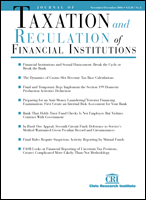Achieving Tax-Exempt Income to the Lender When the Borrower is Tax-Exempt
Author: James D. Goeller.
Source: Volume 25, Number 06, July/August 2012 , pp.50-53(4)

< previous article |next article > |return to table of contents
Abstract:
Following enactment of the American Recovery and Reinvestment Act (ARRA), not-for-profit organizations have sought a break on the interest rate being charged on their bank loans on the assumption that under ARRA such interest payments are tax-exempt. But just because the borrower files a federal Form 990 instead of a federal Form 1120 does not make the interest paid to the lending bank tax exempt. The Section 501(c)(3) organization is tax-exempt, not the interest on its obligations—most of the time. This column covers the exceptions to the rule—i.e., situations where a loan to a Section 501(c)(3) entity may result in tax-exempt income for a bank lender.Keywords: interest expense disallowance provisions; private activity bonds; use of proceeds requirements; debt-tracing rules
Affiliations:
1: Crowe Horwath LLP.